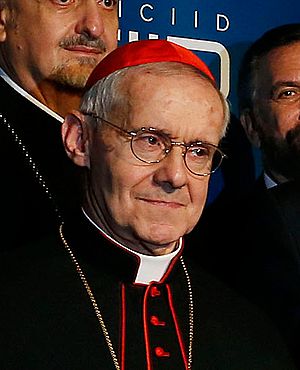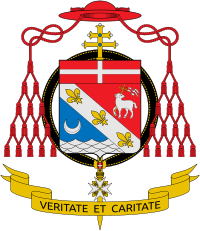Jean-Louis Tauran facts for kids
Quick facts for kids His Eminence Jean-Louis Tauran |
|
|---|---|
| President of the Pontifical Council for Interreligious Dialogue Camerlengo of the Holy Roman Church |
|
 |
|
| Appointed | 25 June 2007 (President) 20 December 2014 (Camerlengo) |
| Predecessor | Paul Poupard (President) and Tarcisio Bertone (Camerlengo) |
| Successor | Kevin Joseph Farrell (Camerlengo) Miguel Ángel Ayuso Guixot (President) |
| Other posts | Cardinal-Priest of Sant’Apollinare alle Terme Neroniane-Alessandrine "pro hac vice" (2003-18) |
| Orders | |
| Ordination | 20 September 1969 |
| Consecration | 6 January 1991 by Pope John Paul II |
| Created Cardinal | 21 October 2003 |
| Rank |
|
| Personal details | |
| Birth name | Jean-Louis Pierre Tauran |
| Born | 5 April 1943 Bordeaux, France |
| Died | 5 July 2018 (aged 75) Hartford, Connecticut, U.S. |
| Nationality | French |
| Denomination | Catholic (Roman Rite) |
| Previous post |
|
| Alma mater |
|
| Motto |
|
| Coat of arms |  |
| Styles of Jean-Louis Tauran |
|
|---|---|
 |
|
| Reference style | His Eminence |
| Spoken style | Your Eminence |
| Informal style | Cardinal |
| See | Thelepte (titular see) |
Jean-Louis Pierre Tauran (born 5 April 1943 – died 5 July 2018) was an important French cardinal in the Catholic Church. A cardinal is a senior leader in the Catholic Church, chosen by the Pope. When he passed away, he was the president of the Pontifical Council for Interreligious Dialogue. This group works to build understanding between different religions. He was also the Camerlengo of the Holy Roman Church, a special role that manages the Church's affairs when a Pope dies or resigns. He became a cardinal in 2003. From 2011 to 2014, he was the Cardinal Protodeacon, the most senior cardinal-deacon. Earlier in his career, he worked for almost 30 years in the Holy See's diplomatic service. The Holy See is the government of the Catholic Church. He also spent several years as the Vatican's main archivist and librarian.
Contents
Early Life and Church Career
Jean-Louis Tauran was born in Bordeaux, France. He studied at the Pontifical Gregorian University in Rome, Italy. There, he earned degrees in philosophy and theology, and a doctorate in canon law. Canon law is the set of rules and laws of the Catholic Church. He also studied at the Pontifical Ecclesiastical Academy in Rome and the Catholic University of Toulouse in France.
He became a priest on 20 September 1969. After that, he worked as a priest in the Archdiocese of Bordeaux. In 1975, he joined the Vatican's diplomatic service. This means he worked as a diplomat for the Pope. He served in the Dominican Republic and Lebanon. Later, he took part in special missions in Haiti, Beirut, and Damascus. He also joined the Vatican's group at meetings about European security and disarmament.
Secretary for Relations with States
On 1 December 1990, Pope John Paul II chose Tauran to be the Secretary for Relations with States. This role is like being the foreign minister for the Vatican. He was also made an Archbishop. He became a bishop on 6 January 1991, with Pope John Paul II himself leading the ceremony. As Secretary, Tauran was the Vatican's top diplomat. He often spoke about the importance of talking and working together. For example, regarding the Iraq conflict in 2003, he said that a war without good reason would be a "crime against peace." He stressed the importance of the United Nations.
Cardinal-Deacon, Archivist, and Librarian
On 21 October 2003, Pope John Paul II made Tauran a Cardinal-Deacon. A cardinal-deacon is a specific rank of cardinal. Soon after, on 24 November, he was put in charge of the Vatican Secret Archives and the Vatican Library. These are very important collections of historical documents and books for the Church.
In 2003, Cardinal Tauran pointed out that non-Muslims were sometimes treated unfairly in some Muslim countries, especially Saudi Arabia. He also represented the Pope at the opening of a new Holocaust museum in Jerusalem in 2005.
Cardinal Tauran was one of the cardinals who voted in the 2005 papal election that chose Pope Benedict XVI. He also voted in the 2013 election that chose Pope Francis. Before the 2013 election, some people thought he might become Pope, even though he had some health issues. As the most senior Cardinal-Deacon, he had the special job of announcing the election of Pope Francis on 13 March 2013. He also placed the pallium (a special scarf) on Pope Francis during his inauguration.
Cardinal Tauran said that preparing for the "Habemus Papam" (We have a Pope!) announcement was a very spiritual experience. He felt it showed the unique nature of the Catholic Church. On 12 June 2014, Pope Francis promoted Cardinal Tauran to the rank of Cardinal-Priest.
President of the Pontifical Council for Interreligious Dialogue
Even though he had Parkinson's disease, a condition that affects movement, Cardinal Tauran was appointed president of the Pontifical Council for Interreligious Dialogue on 25 June 2007. This council works to promote understanding and respect between Catholics and people of other religions.
He held many important roles within the Vatican. He was a member of several groups that deal with different aspects of the Church, such as faith, Eastern Churches, and culture.
Cardinal Tauran was friends with Anglican religious leaders, including John Andrew and Roger Greenacre. He even traveled to England to preach at Greenacre's 50th anniversary of becoming a priest.
In April 2012, for the Buddhist festival of Vesak, Cardinal Tauran sent a message. He said that "Young people are an asset for all societies." He asked for education about different religions. This would help young people work together to solve problems and promote friendship and peace. In June 2013, Pope Francis also named Cardinal Tauran to a special group. This group was looking into the Institute for the Works of Religion, which handles the Vatican's finances.
Camerlengo
On 20 December 2014, Pope Francis chose Cardinal Tauran to become the Camerlengo of the Holy Roman Church. He officially took on this role on 9 March 2015. The Camerlengo is in charge of the Church's property and finances when the Pope is not in office. This role is very important during the time between popes, such as after a Pope dies or resigns.
Death
Cardinal Tauran had been dealing with Parkinson's disease since 2003. He passed away at the age of 75 on 5 July 2018, in Hartford, Connecticut, where he was receiving treatment for his condition. His body was brought back to Rome for his funeral.
Views
War in Iraq
Cardinal Tauran was a strong voice against the U.S. plans to invade Iraq in 2003. He believed it would be a "crime against peace" and against international rules. In 2007, he said that Christians were better protected in Iraq when Saddam Hussein was in power.
Interfaith Relations
Every year, the Pontifical Council for Interreligious Dialogue sends messages to people of other faiths. For example, they send a message to Hindus for the festival of Diwali. In 2017, Cardinal Tauran's message for Diwali spoke about helping people grow and respecting human dignity and rights. The Council also sends similar messages for the Muslim festival of Eid ul-Fitr and the Buddhist festival of Vesak.
Sharia
In March 2008, Cardinal Tauran spoke about Sharia law. This is a legal system based on Islamic principles. He said that it was important to treat all religions equally. He felt that discussions about interreligious dialogue should not only focus on Islam.
See also
 In Spanish: Jean-Louis Tauran para niños
In Spanish: Jean-Louis Tauran para niños
 | Kyle Baker |
 | Joseph Yoakum |
 | Laura Wheeler Waring |
 | Henry Ossawa Tanner |

